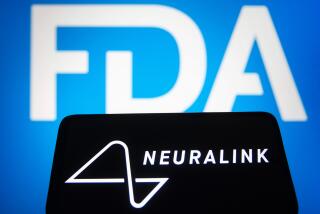Biotech Rules Fall Short
- Share via
* With many grocery stores still cleaning the remaining recalled products containing genetically engineered StarLink corn off their shelves, the Food and Drug Administration released a weak new policy regulating these genetically engineered foods that will do nothing to protect consumers or the environment [“FDA Proposes Regulations for Bioengineered Crops,” Jan. 18].
The FDA’s new policy does not require that genetically altered foods be tested before going to market, so we have no way of knowing the long-term effects these foods will have on our health and the environment. Scientists have already raised serious concerns about these foods, such as allergens and toxins in foods, increased pesticide use, harm to wildlife and the potential for pollen to contaminate non-altered and organic crops.
The FDA also does not require that genetically altered foods be labeled, even though an overwhelming number of American consumers believe the government should require labeling of genetically altered foods and ingredients (86% in a recent Harris Poll). Without testing or labeling, American consumers are the guinea pigs in this food experiment, and we are not even given the choice.
By requiring mandatory notification and voluntary labeling in its new policy, the FDA is trying to give consumers a false sense of security, the sense that the government is providing a safeguard when really all it is doing is appeasing the biotech industry.
We, the consumers, the guinea pigs here, need to demand that our foods are tested and labeled before going on the market. It is our right to have safe food, and it is the FDA’s job to uphold that right.
KATE MADIGAN
Program associate
State Public Interest
Research Groups
Los Angeles
More to Read
Inside the business of entertainment
The Wide Shot brings you news, analysis and insights on everything from streaming wars to production — and what it all means for the future.
You may occasionally receive promotional content from the Los Angeles Times.










